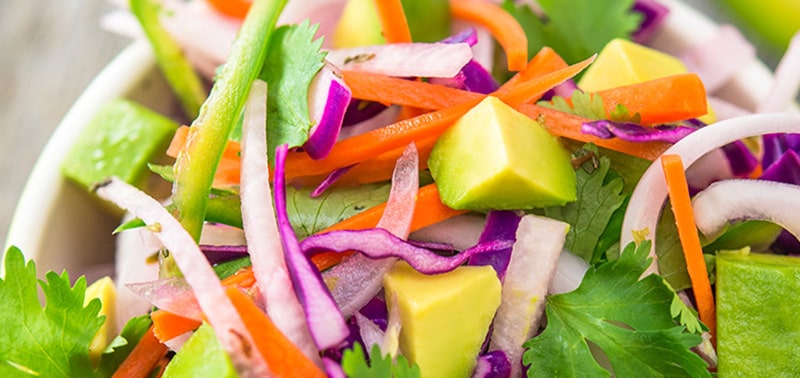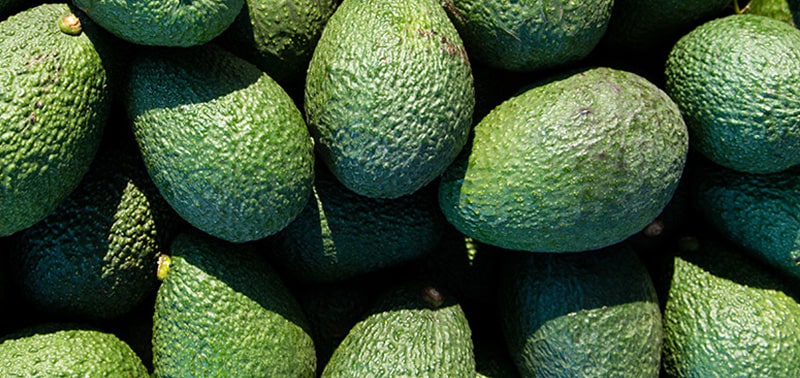1/3 medium avocado contains…
(50g serving)

Avocados have lower calories per serving than fruits like banana and vegetables like potatoes. Reduce total calories in a recipe by substituting avocado for a higher-calorie ingredient like spreads.
Your risk for heart disease increases if you have too much cholesterol in your blood. Avocados, like all plants, are cholesterol-free.
Avocados are sugar-fee per serving, and do not affect the glycemic response.
For those with diabetes, infants, toddlers and children, it’s important to limit foods high in sodium. Avocados are sodium free.
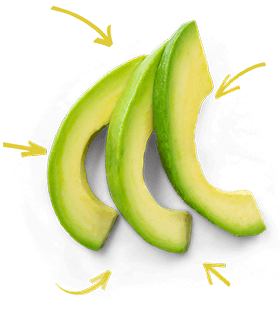
Avocados are a good source of fiber, which slows digestion and helps keep you full and satisfied.
The body needs some dietary fat to help with the absorption of nutrients. Good fats do not raise LDL (bad) cholesterol levels.
Avocados are a good source of folate. Folate is an essential vitamin required to make DNA and other genetic material; this is especially important for women considering pregnancy.
Potassium is responsible for proper nerve, heart, and kidney function. Potassium may blunt salt’s effect on blood pressure as well as reduce the risk of developing kidney stones and possibly bone loss as we get older.
Facts Label

Nutrition Facts
3 servings per container
Serving Size 1/3 medium (50g)
| Amount Per Serving | ||
|---|---|---|
| Calories | 80 | |
| % Daily Value* | ||
| Total Fat 8g | 10% | |
| Saturated Fat 1g | 5% | |
| Trans Fat | - | |
| Polyunsaturated Fat 1g | - | |
| Monounsaturated Fat 5g | - | |
| Cholesterol 0mg | 0% | |
| Sodium 0mg | 0% | |
| Total Carbohydrate 4g | 1% | |
| Dietary Fiber 3g | 11% | |
| Total Sugars 0g | - | |
| Includes 0g Added Sugars | - | |
| Protein 1g | - | |
| Vitamin D 0mcg | 0% | |
| Calcium 10mg | 0% | |
| Iron 0.3mg | 2% | |
| Potassium 250mg | 6% | |
| Vitamin A 0mcg | 0% | |
| Vitamin C 4mg | 4% | |
| Vitamin E 1mg | 6% | |
| Vitamin K 11mcg | 10% | |
| Thiamin 0.04mg | 4% | |
| Riboflavin 0.1mg | 8% | |
| Niacin 1mg | 6% | |
| Vitamin B6 0.1mg | 6% | |
Folate (0mcg folic acid)45mcg DFE |
10% | |
| Pantothenic Acid 0.7mg | 15% | |
| Phosphorus 30mg | 2% | |
| Magnesium 15mg | 4% | |
| Zinc 0.3mg | 2% | |
| Copper 0.1mg | 10% | |
| Manganese 0.1mg | 4% | |
The % Daily Value (DV) tells you how much a nutrient in a serving of food contributes to a daily diet. 2,000 calories a day is used for general nutrition advice.
*The % Daily Value tells you how much a nutrient in a serving of food contributes to a daily diet. 2,000 calories a day is used for general nutrition advice.
Nutrition Facts
3 servings per container
Serving Size 1/3 medium (50g)
| Amount Per Serving | ||
|---|---|---|
| Calories | 80 | |
| % Daily Value* | ||
| Total Fat 8g | 10% | |
| Saturated Fat 1g | 5% | |
| Trans Fat | - | |
| Polyunsaturated Fat 1g | - | |
| Monounsaturated Fat 5g | - | |
| Cholesterol 0mg | 0% | |
| Sodium 0mg | 0% | |
| Total Carbohydrate 4g | 1% | |
| Dietary Fiber 3g | 11% | |
| Total Sugars 0g | - | |
| Includes 0g Added Sugars | - | |
| Protein 1g | - | |
| Vitamin D 0mcg | 0% | |
| Calcium 10mg | 0% | |
| Iron 0.3mg | 2% | |
| Potassium 250mg | 6% | |
| Vitamin A 0mcg | 0% | |
| Vitamin C 4mg | 4% | |
| Vitamin E 1mg | 6% | |
| Vitamin K 11mcg | 10% | |
| Thiamin 0.04mg | 4% | |
| Riboflavin 0.1mg | 8% | |
| Niacin 1mg | 6% | |
| Vitamin B6 0.1mg | 6% | |
Folate (0mcg folic acid)45mcg DFE |
10% | |
| Pantothenic Acid 0.7mg | 15% | |
| Phosphorus 30mg | 2% | |
| Magnesium 15mg | 4% | |
| Zinc 0.3mg | 2% | |
| Copper 0.1mg | 10% | |
| Manganese 0.1mg | 4% | |
The % Daily Value (DV) tells you how much a nutrient in a serving of food contributes to a daily diet. 2,000 calories a day is used for general nutrition advice.
*The % Daily Value tells you how much a nutrient in a serving of food contributes to a daily diet. 2,000 calories a day is used for general nutrition advice.
Download the Facts Label
The avocado nutrition facts label is designed to be compliant with the FDA Guidelines for Nutrition Labeling.
Avocados are
Nutrient-dense
Nutrient-dense foods provide substantial amounts of vitamins, minerals, and other nutrients with relatively few calories.
Avocados contribute nearly 20 vitamins and minerals that can enhance the nutrient quality of the diet. Learn more
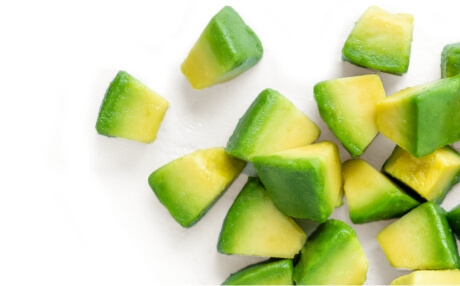
Avocados are a
Nutrient-booster
Healthy avocados can act as a “nutrient booster” by helping increase the absorption of fat-soluble nutrients like vitamin A.
Try this: Mango Guacamole

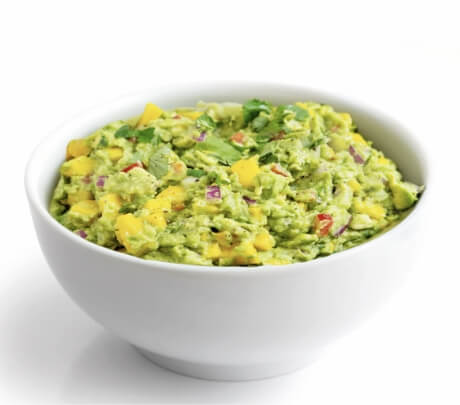
Avocados are
Heart-Healthy
The American Heart Association recommends eating a variety of nutritious foods, which may help you control your weight, cholesterol, and blood pressure.1

Fresh avocados are Heart-Check certified and can help you meet the diet recommendations of the American Heart Association.
Avocados contain
Phytosterols
Phytosterols are naturally occurring substances found in avocados and other plant foods that help to block the absorption of cholesterol in the body when consumed twice daily as part of a diet that is low in saturated fat and cholesterol.
Avocado
Serving Size
vs Portion Size
You might think that serving size and portion size are the same, but there is a key difference. Learn the difference
Avocado
Nutrition Facts Chart Download
See just how fresh avocados deliver a nutrient package that satisfies in this downloadable PDF.

Avocado
Nutrition Advice
The Dietary Guidelines for Americans emphasize making small changes towards achieving an overall healthy eating pattern, such as replacing foods higher in saturated fats with foods containing good fats, like avocados.
Eating a variety of fruits and vegetables, like avocados, is associated with a reduced risk of many chronic diseases, including heart disease, and may protect against certain types of cancers.2
Start Simple with MyPlate.
Let’s explore the key nutritional components that make avocados a true powerhouse fruit.
How Are Avocados Nutritious?
Vitamins and Minerals in Avocado:
Avocados are a nutrient-dense food made up of mostly water and fiber and are considered low-energy dense fruit. Nutrient density refers to the amount of nutrients a food contains per calorie, and energy density refers to the number of calories per gram of food.
In other words, avocados are loaded with nutrients and are calorie-smart!
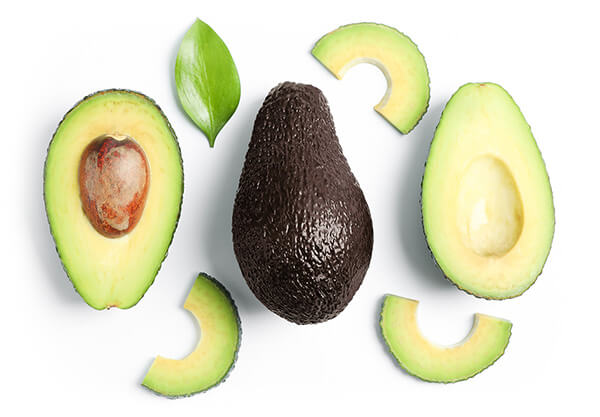
They boast an impressive array of vitamins and minerals per 50 g serving, or one-third of a medium avocado, including:
250 milligrams of potassium: Potassium is a key electrolyte essential for muscle function and fluid balance. It helps counteract the effects of salt on blood pressure, reduces the risk of kidney stones, and supports bone health as we age. Low potassium intake may increase the risk of various health issues, including hypertension, stroke, kidney stones, bone problems, and challenges in blood glucose control, potentially leading to type 2 diabetes.
4% of the Daily Value (DV) of vitamin C: Vitamin C is an antioxidant that may contribute to healthy immune function and is essential for the growth and repair of tissue throughout the body, and is important for skin health.
10% DV of vitamin K: Vitamin K is vital for blood clotting, healthy bones, and other functions in the body.
6% DV of vitamin E: Vitamin E helps keep the immune system strong against viruses and bacteria.
Interestingly, dietary folate found naturally in food shows promise in lowering the risk of certain cancers, though more research is needed to understand its impact fully. Moreover, individuals with low blood folate levels might be more susceptible to depression and may not respond as well to antidepressant treatment compared to those with normal folate levels. However, further research is required to grasp the connection between folate and depression fully.
15% DV of pantothenic acid: Pantothenic acid fuels your body by helping turn food into energy.
4% DV of magnesium: Magnesium helps maintain normal nerve and muscle function, supports a healthy immune system, keeps the heartbeat steady, and helps bones remain strong. It also helps regulate blood glucose levels and aids in the production of energy and protein.
10% DV of copper: Copper acts as a nutrient booster that supports a healthy immune system and helps the body absorb iron.
- 8% DV of riboflavin: Riboflavin is important for body growth and red blood cell production.
- 6% DV of niacin: Niacin helps the digestive system, skin, and nerves function. It is also vital for converting food to energy in the body.
- 6% DV of vitamin B6: Vitamin B6 helps the body make antibodies, maintain normal nerve function and produce red blood cells.
Healthy Fats/Cholesterol in Avocado
Avocados stand out in their heart-friendly monounsaturated fats (MUFA) content. Surprisingly, they’re essentially the only fruit packed with these good fats!
Just one-third of a medium avocado provides a satisfying 5 grams of MUFA.
These healthy fats have been associated with better heart health, as they help lower bad cholesterol levels and decrease the risk of heart disease. Even better, avocados are cholesterol-free and contain minimal saturated fats, making them a top pick for a heart-healthy diet.
Sodium
Avocados are naturally sodium-free, making them an excellent choice for those aiming to maintain healthy blood pressure and heart health. Opting for sodium-free foods that also contain potassium, like avocados, can help promote overall heart health and lower the risk of hypertension.
Protein
In addition to being a source of healthy fats and fiber, avocados also contain a modest amount of protein (1g per serving). While they may not be as protein-rich as other foods, such as meat or legumes, avocados still contribute to your daily protein intake.
Including avocados in your diet can help provide a well-rounded nutrient profile, supporting muscle repair and overall health.
Carbohydrates
Avocados are a great choice for those on low-carb or ketogenic diets, as they’re naturally low in carbohydrates.
Most of the carbohydrates found in avocados come from fiber, which supports digestive health and helps with weight management.
So, whether you’re watching your carb intake or simply aiming for a balanced diet, avocados are a fantastic addition to your meals.
Fiber in Avocado
Avocados are a good source of dietary fiber, with one-third of a medium avocado containing approximately 3 grams of fiber. Fiber is essential for promoting regular bowel movements, supporting gut health, and reducing the risk of chronic diseases such as heart disease and diabetes.
Phytosterols in Avocado
Avocados contribute approximately 38 milligrams of beta-sitosterol per 50g serving. Phytosterols are naturally occurring substances found in avocados and other plant foods. Consuming phytosterols twice daily, as part of a diet low in saturated fat and cholesterol, may help maintain healthy cholesterol levels by blocking the absorption of cholesterol in the body.
So, including avocados in your daily meals can be a delicious and beneficial way to support your heart health.
Avocados vs Other Fruits and Vegetables
|
Nutrient content comparison of avocado to 5 top fruits sold in US[1] (RACC) |
||||||
|
|
Fresh Avocado |
Apple raw with skin |
Raw Banana |
Fresh Orange, peeled |
Fresh Grapes |
Fresh Strawberries |
|
Serving Size |
50 g |
242 g |
126 g |
154 g |
126 g |
147 g |
|
Household serving |
1/3 cups |
2 cups, chopped |
1 med/large |
slightly more than 1 fruit |
26 grapes |
12 medium berries |
|
Calories |
80 |
207 |
112 |
132 |
87 |
47 |
|
Fiber (g) |
3 |
6 |
3 |
3 |
1 |
3 |
|
Potassium (mg) |
250 |
259 |
451 |
256 |
241 |
225 |
|
Vitamin K |
11 |
5 |
0.6 |
0 |
18 |
3 |
|
Folate |
45 |
7 |
25 |
52 |
3 |
35 |
|
Vitamin E |
1 |
0.4 |
0.1 |
0.2 |
0.2 |
0 |
|
Sugar |
0.2 |
25 |
19 |
13 |
20 |
7 |
- Despite a smaller serving size, avocados have as much fiber as bananas, oranges, and strawberries; have a comparable amount of potassium as apples, oranges, and grapes; and have more vitamin E than apples, bananas, oranges, grapes, and strawberries.
- Per serving, avocados also have fewer calories than apples, bananas, oranges, and grapes.
|
Nutrient content comparison of avocado to 5 top vegetables sold in US[1] (RACC) |
||||||
|
|
Fresh Avocado |
Potato |
Onion |
Tomato |
Carrot |
Bell Pepper |
|
Serving Size |
50 g |
148 g |
148 g |
148 g |
85 g |
148 g |
|
Household serving |
1/3 cup |
approx 1 small |
approx 1/2 onion |
approx 1.5 small |
8 baby carrots |
1 cup, chopped |
|
Calories |
80 |
138 |
47 |
27 |
30 |
39 |
|
Fiber (g) |
3 |
3 |
1 |
2 |
2.5 |
3 |
|
Potassium (mg) |
250 |
792 |
176 |
351 |
201 |
314 |
|
Vitamin K |
11 |
3 |
0.4 |
12 |
8 |
7 |
|
Folate |
45 |
41 |
34 |
22 |
23 |
69 |
|
Vitamin E |
1 |
0.1 |
0.3 |
0.8 |
0 |
2 |
|
Sugar |
0.2 |
2 |
7 |
4 |
4 |
6 |
- Per serving, avocados have fewer calories than potatoes.
- Despite their smaller serving size, avocados pack in just as much fiber as potatoes, carrots, and bell peppers, three times the fiber content of onions, and boast more potassium than onions or carrots. Additionally, avocados offer more vitamin K than potatoes, onions, carrots, and bell peppers, as well as more folate than potatoes, onions, tomatoes, and carrots.
References: 1. National Nutrient Database for Standard Reference Legacy Release. April 2019 Avocados, raw, California; apples, raw, with skin (Includes foods for USDA’s Distribution); bananas, raw; oranges, raw, navels (Includes foods for USDA’s Food Distribution Program); grapes, red or green (European type, such as Thompson seedless), raw; strawberries, raw Top 20 fruits and vegetables sold in the US. https://www.pma.com/content/articles/2017/05/top-20-fruits-and-vegetables-sold-in-the-us. Accessed 2/27/2019 2. National Nutrient Database for Standard Reference Legacy Release. April 2019. Avocados, raw, California; potatoes, baked, flesh and skin, without salt; onions, sweet, raw; tomatoes, red, ripe, raw, year-round average; carrots, baby, raw; peppers, sweet, red, raw
What Health Benefits Do Avocados Offer?
In addition to their impressive nutritional profile, avocados offer a wide range of health benefits. Here are just a few.
Nutrients and Fat-Soluble Vitamins
The fat-soluble vitamins found in avocados, such as vitamin E, contribute to healthy skin, hair, and nails, while supporting immune function and inflammation regulation.
But here’s where avocados truly shine as nutrient boosters!
Their unsaturated fats allows them to enhance the absorption of fat-soluble nutrients such as vitamins A, D, K, and E from other foods in your diet. The best part? Enjoying avocados doesn’t raise LDL (bad) cholesterol levels when consumed as part of a healthy eating plan.
So, by adding avocados to your meals, you’re not just treating your taste buds but also helping your body make the most out of the nutrients it consumes.
Heart Health
Fresh avocados are a cornerstone of a heart-healthy diet. They are low in saturated fats and cholesterol—and sodium-free, which makes them an optimal choice for supporting heart health. By incorporating avocados into your daily meals, you not only enhance your intake of fruits and vegetables but also introduce a natural source of beneficial fats. Versatile and flavorful, avocados can seamlessly replace butter or oil in baked goods or higher-fat cheeses in savory dishes like tacos and burritos.
The good, monounsaturated fats found in avocados play a pivotal role in promoting heart health; they can lower LDL (bad) cholesterol levels and elevate HDL (good) cholesterol levels, contributing to a healthier cardiovascular profile. Making avocados a regular part of your heart-healthy eating plan may significantly reduce the risk of heart disease and stroke, ensuring both taste and nutrition go hand in hand in your daily meals.
Cholesterol Absorption
Avocados are not only cholesterol-free but also contain compounds that inhibit the absorption of cholesterol in the body, enhancing their heart-protective benefits. By reducing cholesterol absorption, avocados play a crucial role in maintaining healthy cholesterol levels and supporting overall cardiovascular health.
In a significant clinical study involving 1008 adults with elevated waist circumference, researchers explored the effects of consuming one avocado daily for six months on various health measures. While the primary outcome regarding visceral fat remained unchanged, secondary outcomes showed promising results. Daily avocado consumption was associated with reductions in total and LDL cholesterol levels and improvements in overall diet quality compared to the control group. Although findings from a single study cannot be generalized to broader populations, this research, supported by the Avocado Nutrition Center, adds to a growing body of evidence suggesting that incorporating heart-healthy avocados into your diet may lead to better overall diet quality.
Blood Pressure
The potassium in avocados is essential for maintaining healthy blood pressure levels. By counteracting the effects of sodium in the body, potassium promotes optimal blood pressure and helps reduce the risk of hypertension. When incorporated into the diet as a replacement for other fats, avocados align perfectly with the DASH eating plan, which is renowned for its ability to lower blood pressure and support overall heart health.
Antioxidants
Vegetables and fruits are abundant sources of antioxidants, essential for maintaining overall health. Avocados are packed with antioxidants like vitamins C and E and beneficial phytochemicals such as lutein and zeaxanthin. These powerful antioxidants play a crucial role in neutralizing free radicals within the body, safeguarding cells from harm, and lowering the risk of chronic ailments like cancer and age-related macular degeneration.
Incorporating avocados into your diet is a delicious way to enhance your antioxidant intake and promote long-term well-being.
Diabetes
Avocados offer a sugar-free alternative that won’t cause significant blood glucose spikes when consumed alone, exempting them from glycemic index or weight values. Additionally, their fiber content serves as a valuable asset in regulating blood glucose levels by slowing down digestion and preventing rapid increases in blood glucose after meals.
Monitoring sodium intake is crucial for individuals managing diabetes. Thankfully, avocados are completely free of sodium, making them an excellent choice for maintaining a balanced diet that supports stable blood glucose levels and overall health.
Do Avocados Have a Negative Impact on Health?
Avocados offer numerous health benefits. However, excessive calorie intake may contribute to weight gain. Remember, there are many factors that play into individual nutrition needs; size, age, and activity level are some of the many determinants that dictate your requirements.
When enjoyed as part of a balanced diet, avocados can be valuable to overall health and well-being.
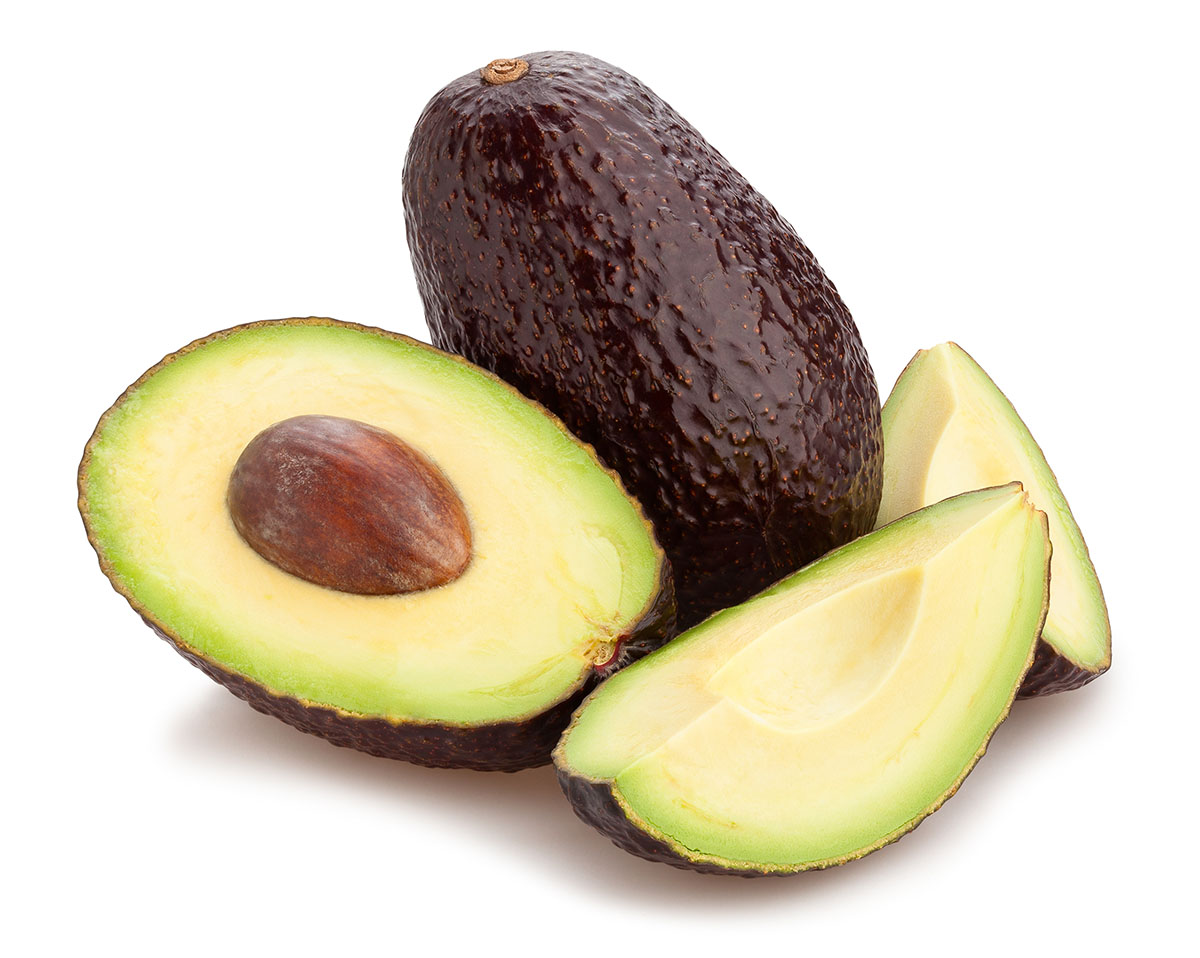
What is the Average Serving Size of Avocado?
Serving Sizes vs. Portion Sizes
Did you know that serving size and portion size aren’t the same thing? A serving size refers to a standardized amount of food that represents the average quantity consumed during a meal or snack, while portion size is the specific amount of food you choose to eat.
It’s important to note that a serving size doesn’t dictate the recommended amount of food to eat; rather, it represents the typical amount consumed. You have the flexibility to consume more or less than the suggested serving size based on your preferences and dietary needs.
For instance, the typical serving size of avocado is 50g or about one-third of a medium avocado. However, opting for more can provide you with even greater nutritional benefits! A whole avocado offers an impressive 18g of MUFA, 10g of dietary fiber, 760mg of potassium, 3g of protein, and remains free of cholesterol and sugar. So, feel free to indulge in the wholesome goodness of avocados and reap the nutritional rewards!
Dietitian/Nutrition Advice
Dietitians commonly advocate for including one serving of avocado in meals as part of a well-rounded diet. This portion size enables individuals to enjoy the nutritional advantages of avocados while effectively managing their overall calorie and fat intake.
Avocados seamlessly fit into various dietary plans, including heart-healthy eating regimens, diabetes-friendly diets, Mediterranean and DASH meal plans, as well as Keto, Paleo, and weight management plans, among others.
Packed with essential vitamins, minerals, healthy fats, and fiber, avocados serve as a nutritional powerhouse. Avocados offer many health benefits, from fostering heart health to facilitating nutrient absorption and supporting healthy blood pressure levels. By incorporating them into your meals in moderation and as part of a balanced diet, you can fully harness their potential, enjoying a delicious and nutritious way to enhance your overall health and well-being. Bon appétit!

